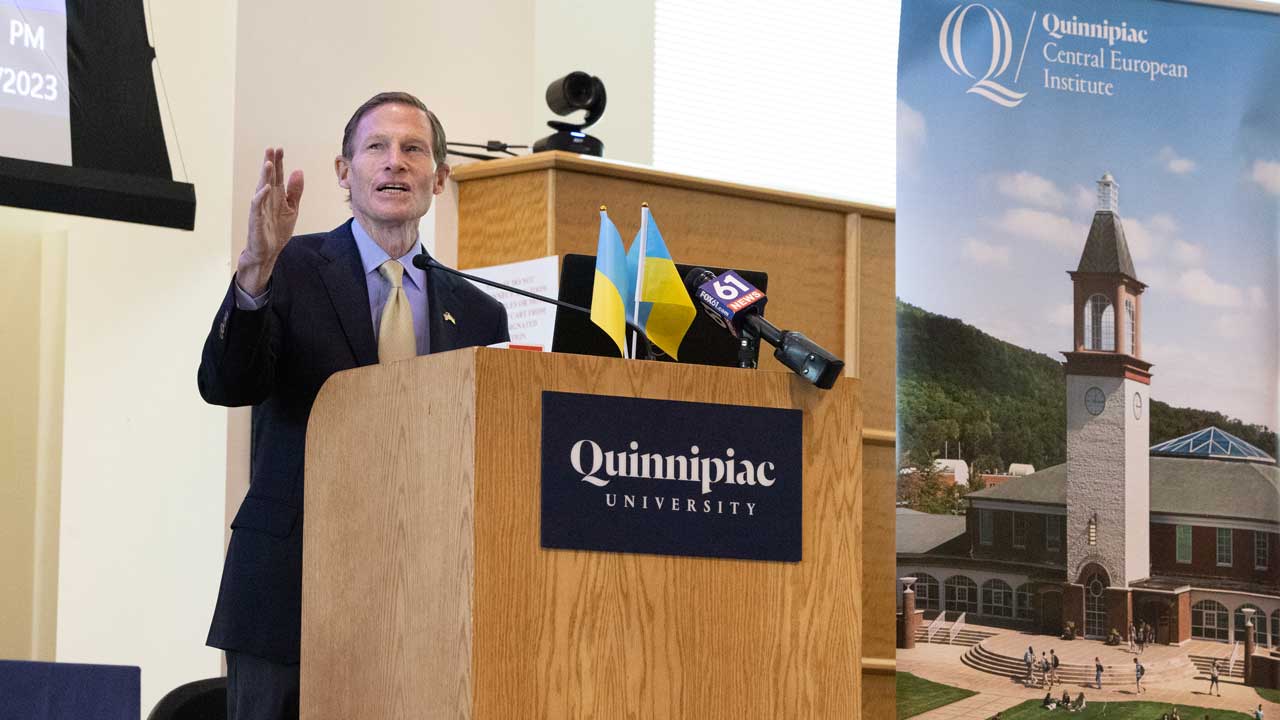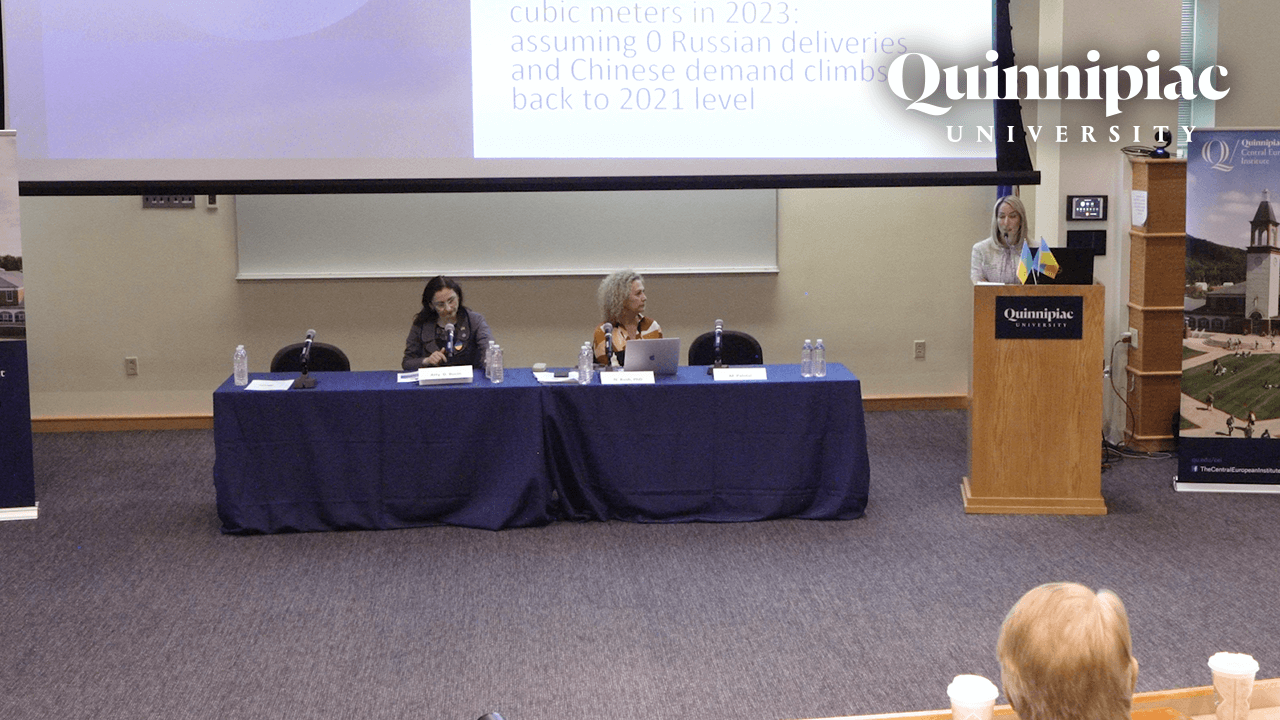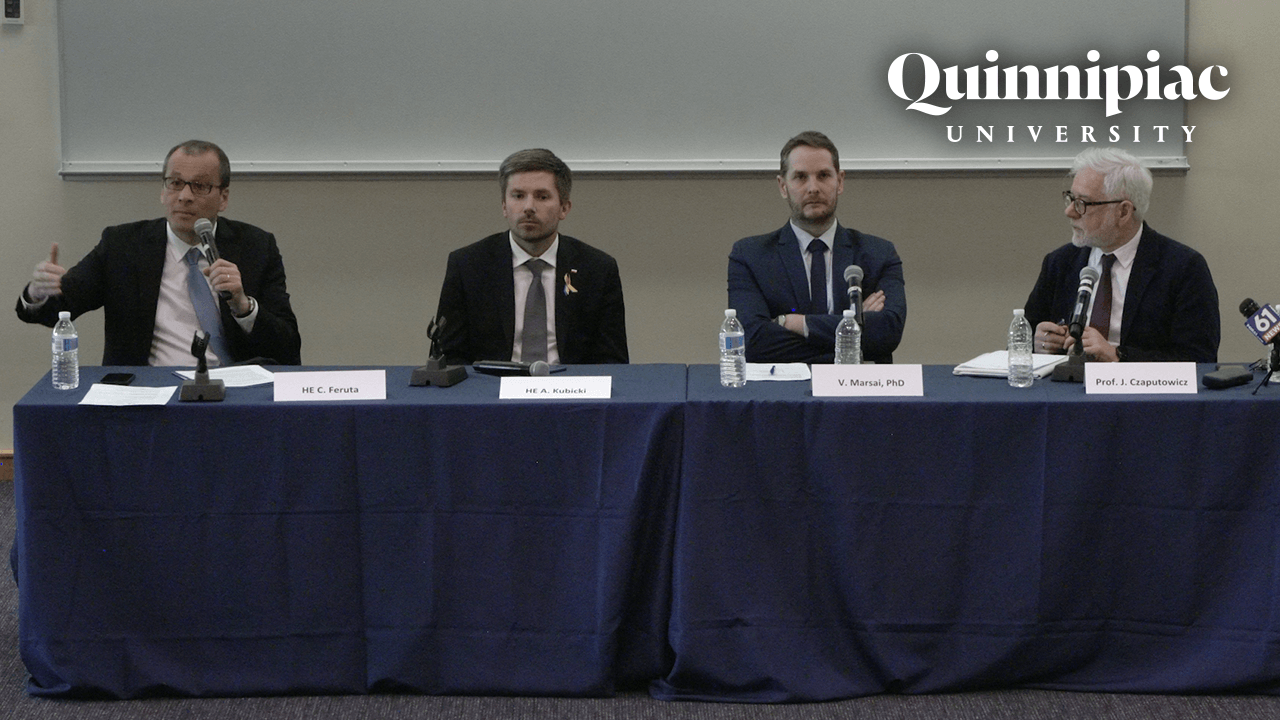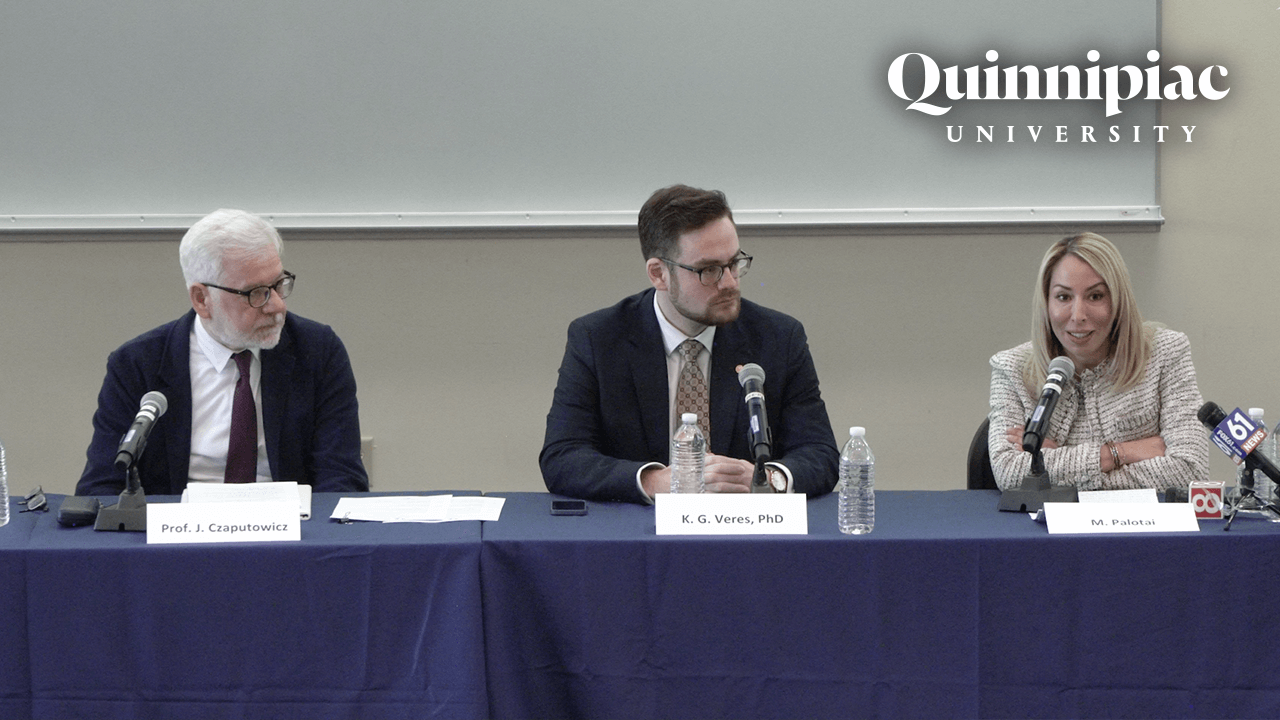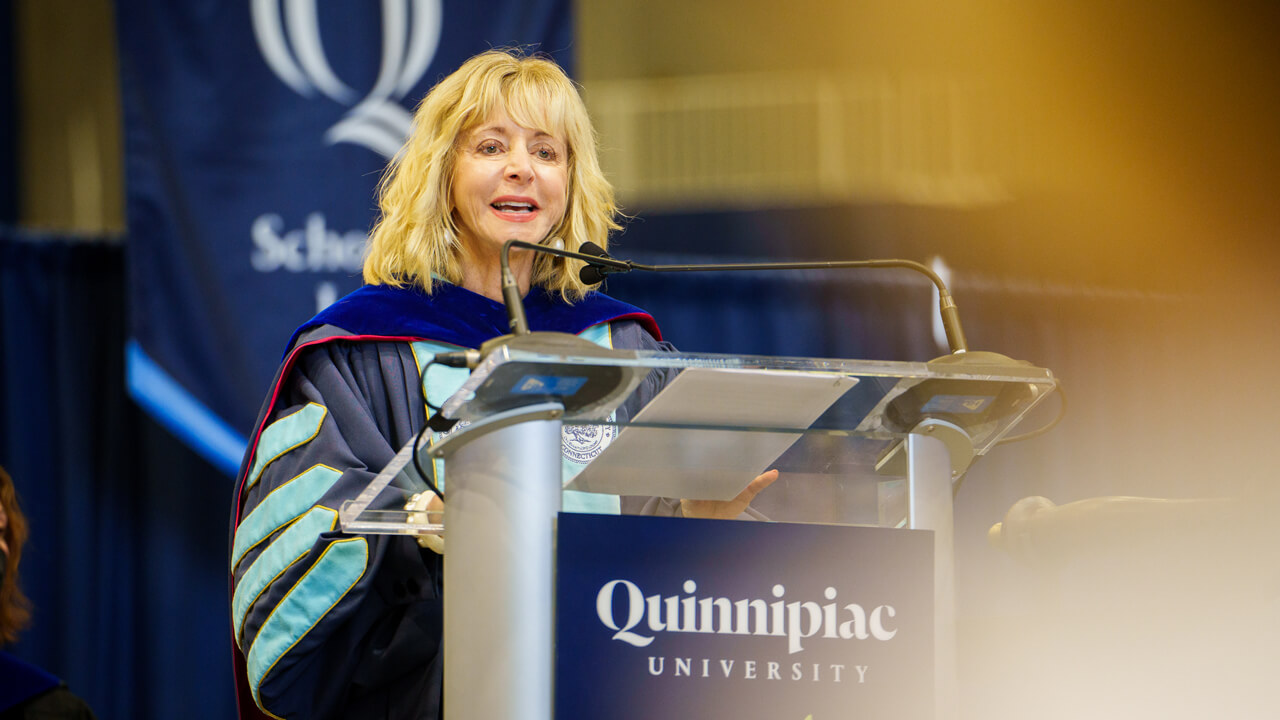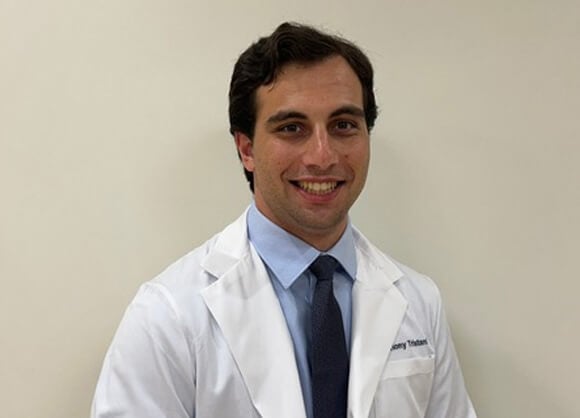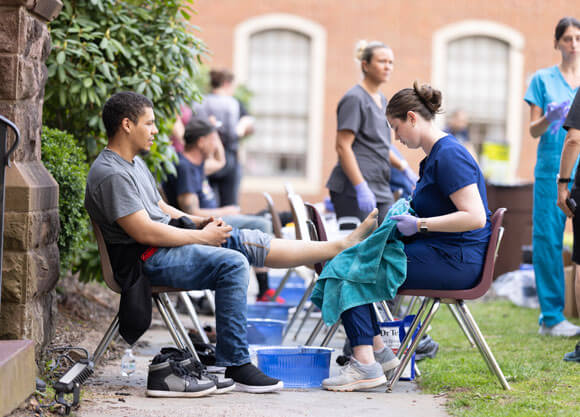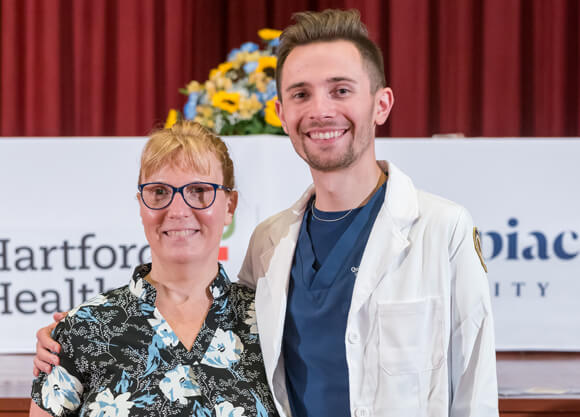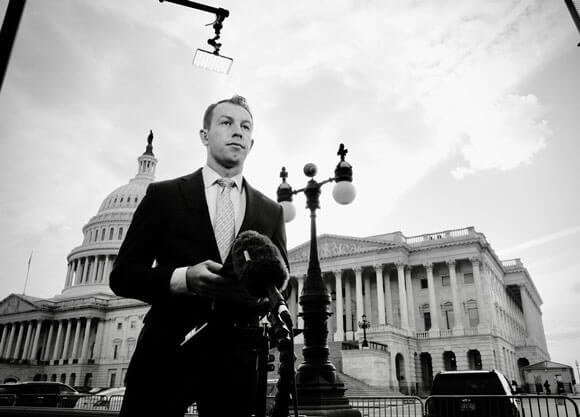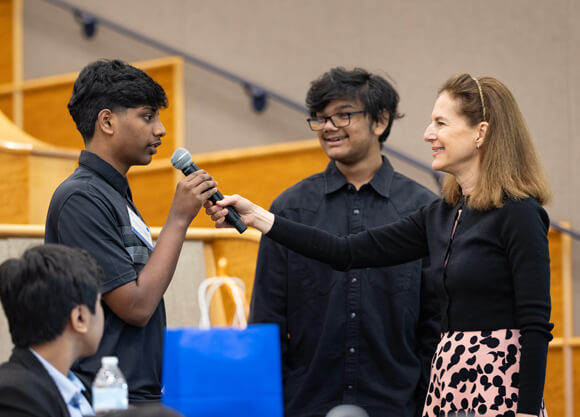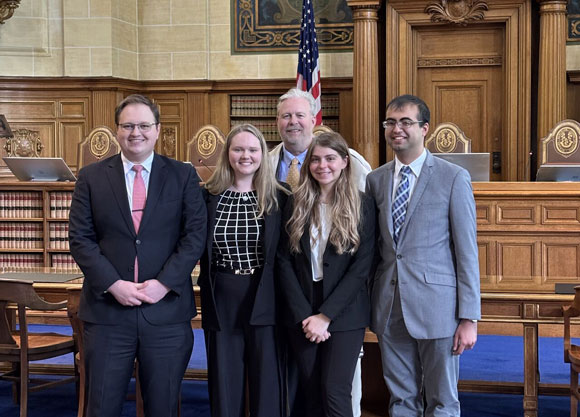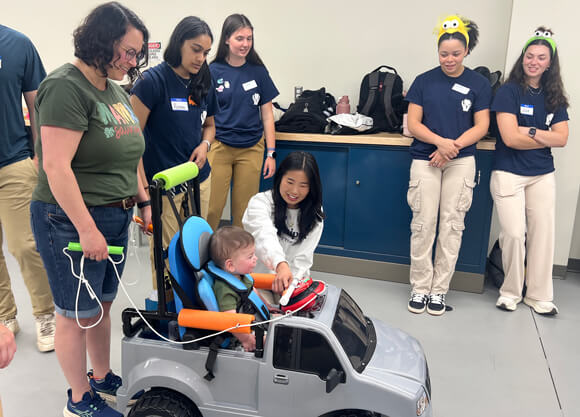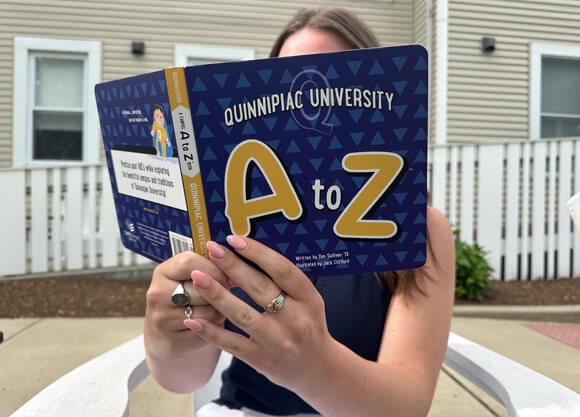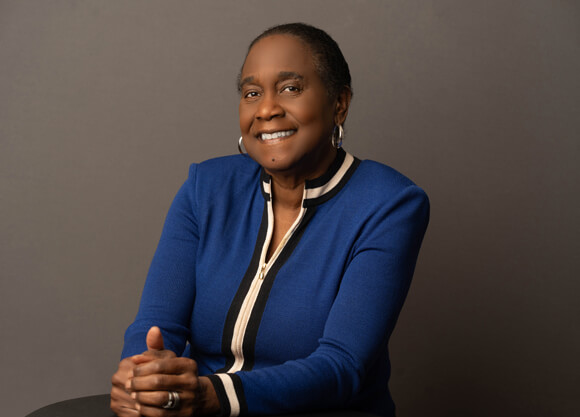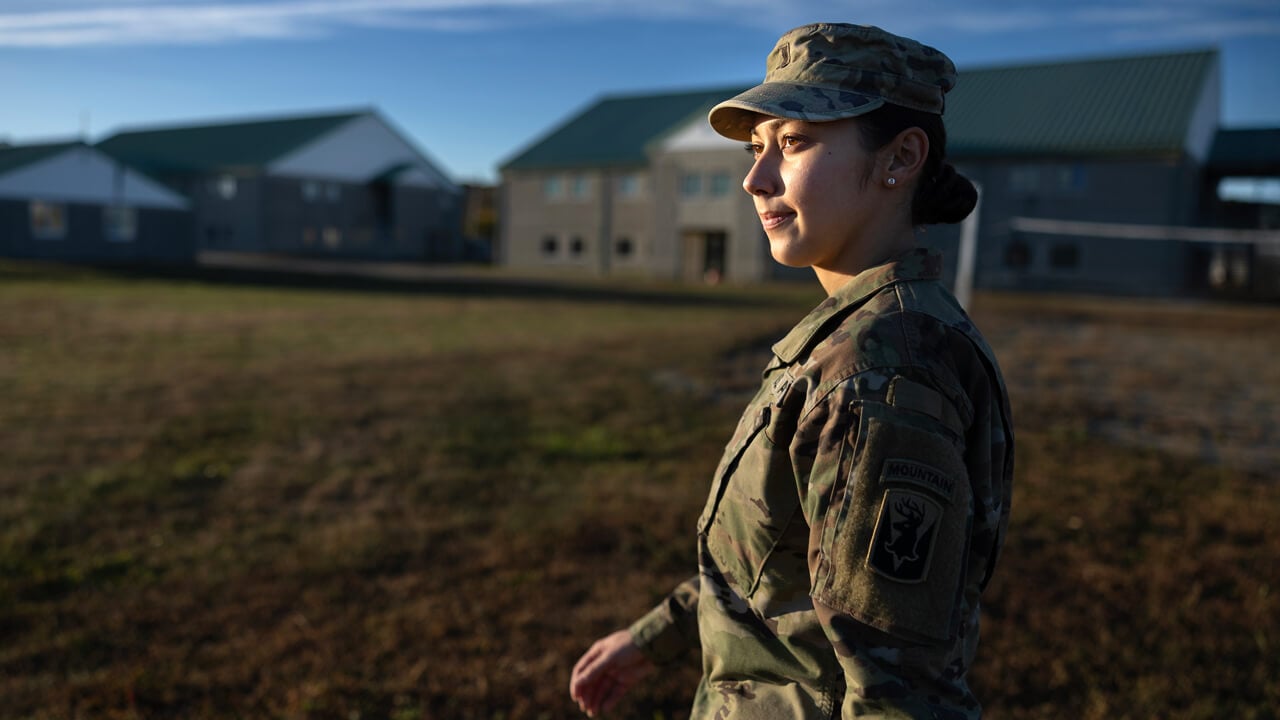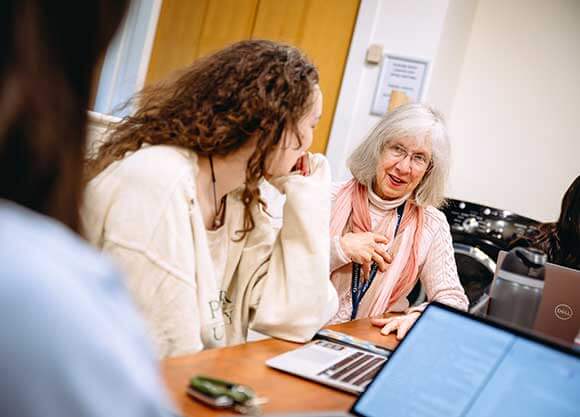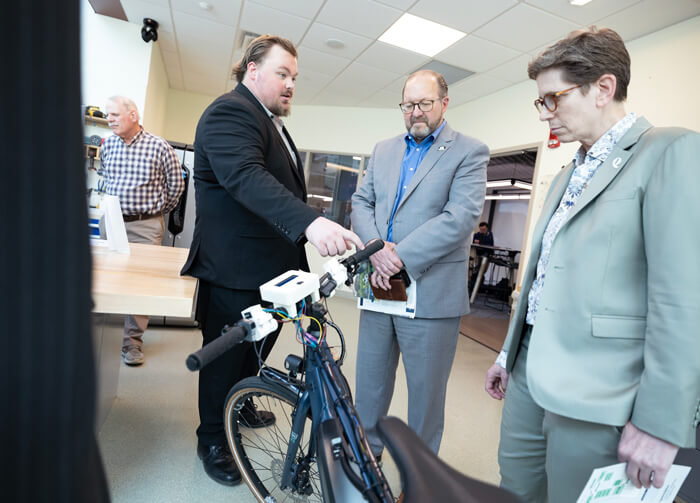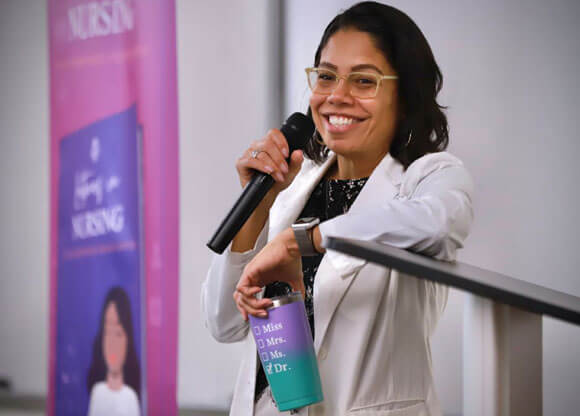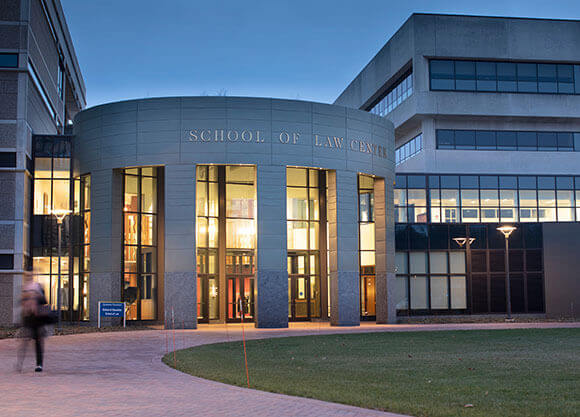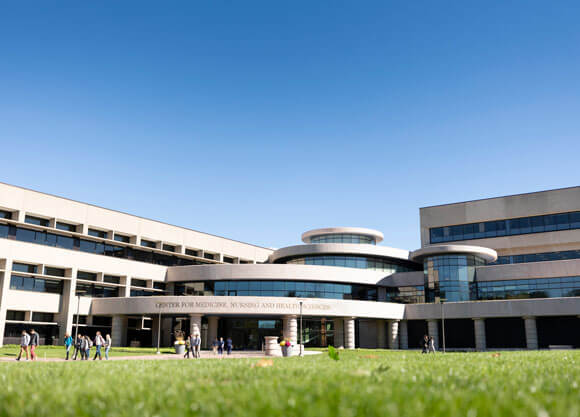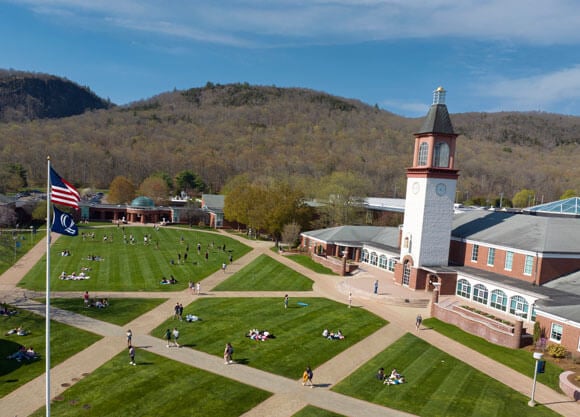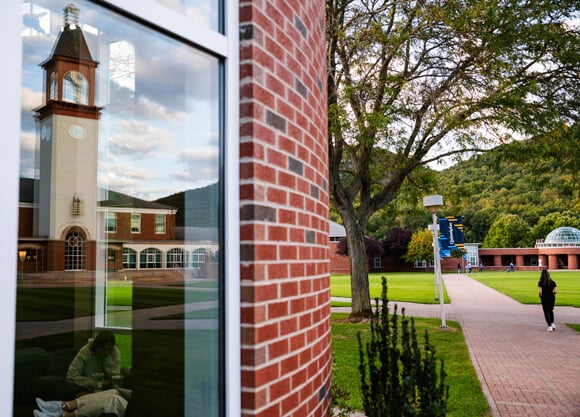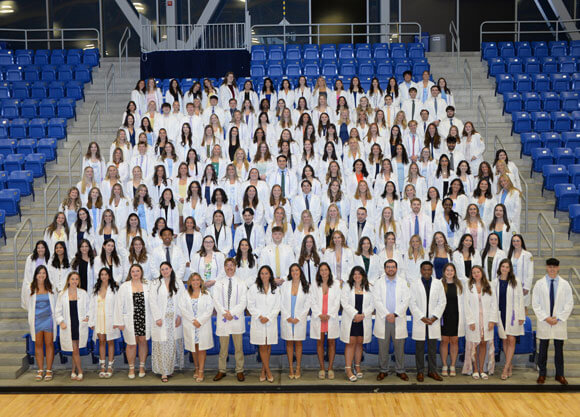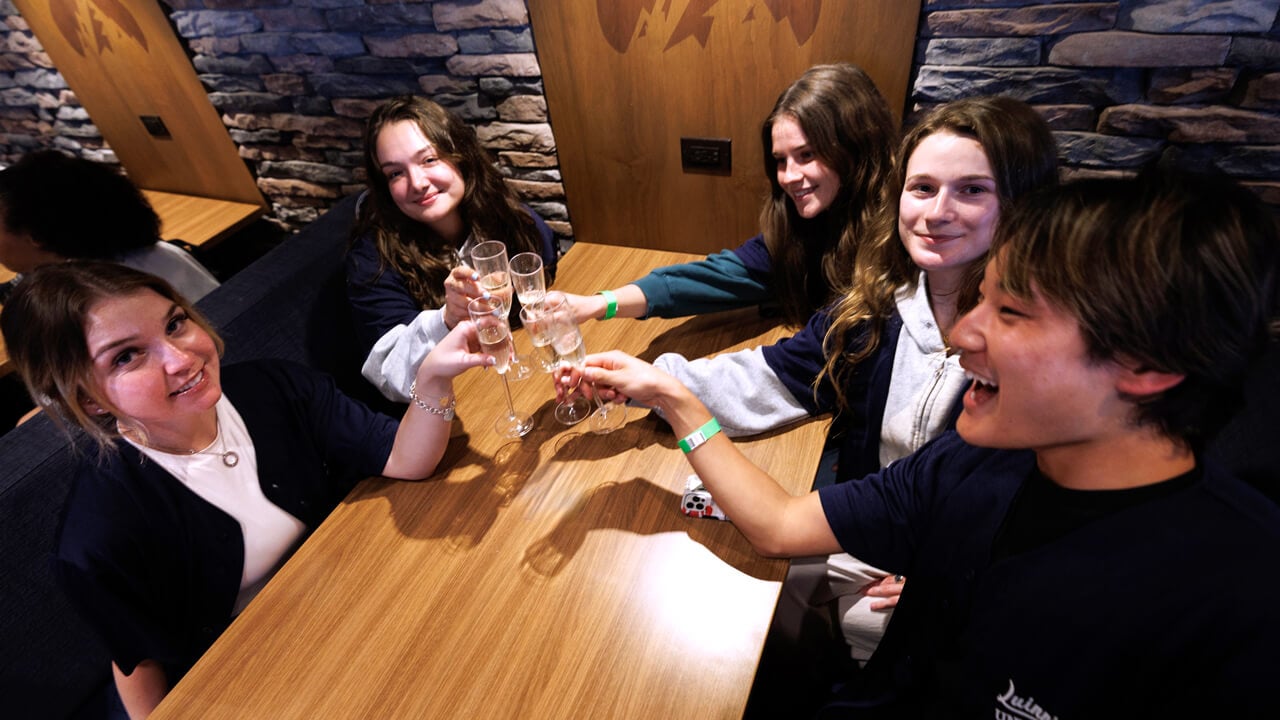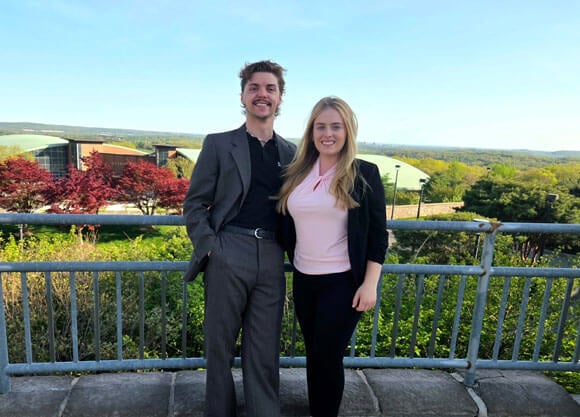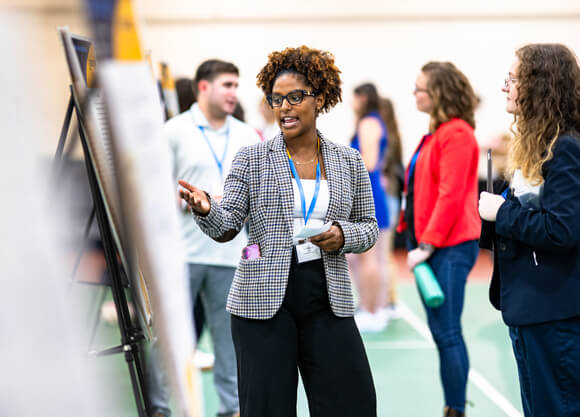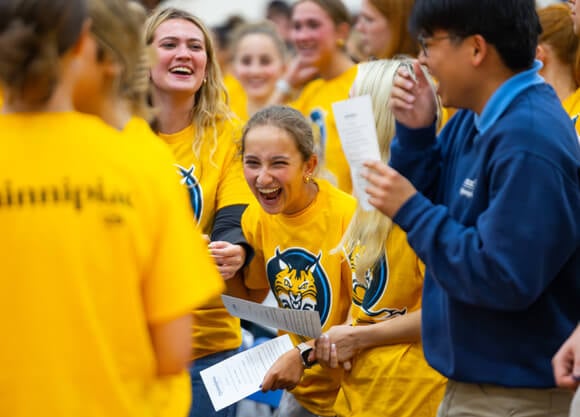
The event was presented by the Quinnipiac Central European Institute (CEI) and organized by its director Christopher Ball, Istvan Szechenyi Chair in international economics and associate professor of economics. Ball is also the Honorary Hungarian Consul for Connecticut.
“The idea for this conference came up several months ago in part because the focus of the American media is all around the military actions, as well it should be,” said Ball. “We were looking at all of the broader implications of this war. It’s a tragic war, and the death toll keeps climbing. We wanted to bring together experts and regional experts to talk about and share what’s going on, discuss what some options are. We also wanted to hear what’s happening in Connecticut.”
According to the latest data from the United Nations Refugee Agency, 8 million refugees of the Ukrainian war are currently in Europe, and 90 percent are women and children. A little more than half of the 8 million have registered as refugees.
Ukrainians have also found refuge in the U.S. through the Uniting for Ukraine program initiated by President Joe Biden. Additionally, according to the Ukrainian Ministry of Social Policy, there are almost 5 million internally displaced persons within the Ukraine, registered as IDPs.
One year into the Russian invasion of Ukraine, the European Union has generated billions of dollars in military and humanitarian support as well has making some major policy shifts among its 27 member states. The U.S. has provided $113 billion of aid and military assistance dollars in support to Ukraine or allied nations, including $6.6 billion to refugees. It is estimated it will cost some $1 trillion for Ukraine’s reconstruction, with refugee integration central to rebuilding.
Due to the refugee crisis caused by the invasion, older models of refugee support quickly evolved to include EU’s “temporary protection” and U.S. “humanitarian parole,” each of which offer fast and efficient protection modes, outside of the regular system. As the invasion continues, experts warned that crisis management and short-term measures to support refugees must now shift to long-term policy and support.
In her welcoming remarks, Quinnipiac President Judy Olian said it was a somber moment to be commemorating Russia’s year-long invasion of Ukraine.
“It’s something that we have to remember, but not one of the auspicious moments that represent a happy anniversary, other than the admiration that we have for the resilience of the Ukrainians,” said Olian. “I’m very glad that we are talking about the implications of this invasion and the way that the U.S. and Europe have responded, and in particular the refugee crisis that has emerged from this.”
In his opening remarks, U.S. Senator Richard Blumenthal said America has come together in support of Ukraine. He said the country must continue providing strong military and humanitarian support.
“My goal, as I go back to Washington, is to make sure that we continue to be steadfast, strong and unwavering in the United States Congress for military and humanitarian assistance that is no less needed now than at the start of this conflict,” said Blumenthal.
Saying Ukrainian refugees in America “…need and deserve assurance that they will be safe and secure in this country,” Blumenthal announced at the Quinnipiac event that he will be offering “The Ukrainian Adjustment Act.” The proposed legislation would provide a path to permanent status for Ukrainian refugees in the US.
Ukrainian Parliament member Oleksandr Vasiuk sent a video message to the Quinnipiac gathering.
“Exactly one year ago, the country of Ukraine woke to explosions. At that moment, every Ukrainian, unfortunately, felt what war was like,” said Vasiuk. “The full-scale invasion has caused the largest migration crisis in Europe since World War II. The sudden displacement of large numbers of people has caused new challenges and aggravated existing ones. This applies to both the temporary refugee hosting communities and those who have suffered an outflow of people. Ukraine is losing manpower, losing specialists in various fields due to the war-caused migration.”
Vasiuk said it’s an “open question” as to how to bring back displaced Ukrainians to rebuild their homes and the country.
“We are going to discuss today how the Ukrainian migration crisis is shaping European and American policy. What is the current situation with internationally displaced people? What are the challenges facing societies of our countries?” he asked, later adding, “We all understand that the longer the full-scale invasion lasts, the more the needs will grow and the more support Ukraine will need.”
Mónika Palotai, visiting researcher for the Hudson Institute led a panel discussion on the challenges in Ukraine and Europe with Kristóf György Veres, Ph.D., senior researcher at the Migration Research Institute in Hungary; Professor Jacek Czaputowicz, former minister of foreign affairs of Poland and senior adviser to the Pulaski Foundation; and, via Zoom, Sviatoslav Hnizdovskyi, CEO of the Open Minds Institute in Ukraine.
Czaputowicz led a roundtable discussion on the EU’s and frontline countries’ responses with the Polish response provided by Adrian Kubicki, Consul General of the Republic of Poland in New York; Romanian response from Cornel Feruta, Romanian ambassador to the UN; and Hungary’s response provided by Viktor Marsai, Ph.D., director of the Migration Research Institute in Hungary.
“We keep our borders very much open for them, and given the dynamics of the war…we must constantly, continuously be open to accommodate them,” said Kubicki. “It wouldn’t be possible without the international collaboration between the countries, particularly between the European countries.”
Hungary has 2.2 million arrivals of refugees displaced by the war in Urkaine, said Marsai.
Based on past experience with long-term Syrian refugees in Hungary, the longer the displacement, the more difficult it is for refugees to return to their native country, as families adjust over several years to spending their lives in a foreign country, finding jobs and placing children in education systems.
“As time is passing, these people are integrating more and more to European society. It’s a huge risk, what will happen; how they can return; whether they want to return to Ukraine to build up after this horrible war,” said Marsai.
In a panel discussion on global and American challenges, moderated by Ball, Palotai discussed the EU’s economics of the refugee crisis.
Nayla Rush, of the Center for Immigration Studies, spoke on the U.S. response to the Ukrainian refugee crisis. Romanian-born attorney Dana Bucin, of the Murtha Cullina Law Firm, discussed her efforts to find Romanian homes for displaced Ukrainians.
Bucin established a Connecticut for Ukraine Refugee Matching Program. On Saturday, Bucin introduced three Ukrainian refugees living in Connecticut to help provide “the real voices” of Ukrainian refugees to audience members. They spoke of their experiences escaping from their war-torn homes and coming to the U.S.
As the crisis continues, a Quinnipiac Ukraine initiative will involve the Central and East European Research Initiative (CEERi), said Ball. Working together virtually and in person, CEERi academic and policy leaders will bring together a global network of affiliated scholars to produce current research on policy-related issues, and support research creating an intellectual foundation for understanding issues into the future.
“There’s just not enough research of the broad issues: migration, energy, economics – going around on this topic,” said Ball.
Ball asked those in attendance support the efforts of several Connecticut-based organizations represented at the event which are continuing efforts to support Ukrainian refugees and Ukraine in this time of war.
After the war ends, he encouraged supporters to consider supporting another Quinnipiac initiative: the Quinnipiac Fund for Ukraine, which will support initiatives related to Ukraine including opportunities for Ukrainian students, faculty and staff to come to Quinnipiac as well as Quinnipiac students, faculty and staff to go to Ukraine in support of targeted programs or for general exchange.
In closing the event, Ball said, “Let’s pray to God we are not meeting here next year.”
In this Article
Stay in the Loop
Quinnipiac Today is your source for what's happening throughout #BobcatNation. Sign up for our weekly email newsletter to be among the first to know about news, events and members of our Bobcat family who are making a positive difference in our world.
Sign Up Now